SCHEME OF WORK
Weeks Topics
1. Revision of last term’s work.
2. Government: (a) The meaning of government (b) Arms of government- the executive, the legislature and judiciary. (c) Offices and symbols of authority in government.
3. Government (cont’d): (d) Functions and powers in government. (e) Need for checks and balances of power in government.
4. Leadership and Followership: (a) Meaning of leadership and followership. (b) Qualities of good leadership and followership: Honesty, probity, discipline and punctuality. (c) Consequences of bad leadership- civil unrest, economic hardship, failure of government programmes, waste of resources, corruption and indiscipline.
5. The Rule of Law: (a) The meaning of law and rule of law. (b) The benefits of the rule of law as against arbitrary rule. (c) Punishment for breaking the law. (d) Equality of all citizens before the laws.
6. The State and The Rule of law: (a) State institution responsible for the formulation and enforcement of the rule of law. (i) the legislature (ii) the executive (iii) the judiciary (iv) law enforcement agencies, e.g. The Police, NDLEA, NAFDAC, EFCC,ICPC, etc. (b)The role of the legislature in making laws for the state.
7. The state and The Rule of Law (cont;d): The role of state Institution/Agencies which enforce the rule of law. (i) the Executive (ii) the judiciary, (iii) the police, and (iv) The Prison Service.
8. Protection of Human Rights and the Rule of Law (Role of individuals and groups): (a) Individuals and groups can help in protecting human rights by: (i) representing the affected person in court, (ii) drawing attention to cases of human rights violations through: *protest match*, media coverage*, hunger strikes.*
9. Protection of Human Rights (cont’d) (b) Groups that assist in protecting human rights of citizens. E.g. (i) Civil Society Organizations (such as: CLO, CDHR, CRP, etc.) (ii) Trade unions (iii) Students’ Unions (iv) Ethnic Associations (v) Legal Aids Council.
10. Revision
2ND TERM
WEEK 1
LESSON 1
Topic: GOVERNMENT
(a) Meaning of government
Government can be defined as an agency or machinery through which the will and policies of the state are formulated, expressed and implemented. Government is also an institution or body of persons that takes care of the interest and welfare of the people.
It is an act of governing or ruling a state. It is seen as an agency, system or organ having a state and maintaining its security, peace and progress. It has its institutional, academic and administrative field of explanation. A state without government therefore will experience anarchy.
https://youtu.be/Q_DeR44gzOw
(b) Arms of government
The business of government of a state is mainly carried out by the three basic organs of government namely: Legislature, Executive and the Judiciary. These arms of government perform their respective constitutional functions which make the government to run without much hitches if they are properly carried out.
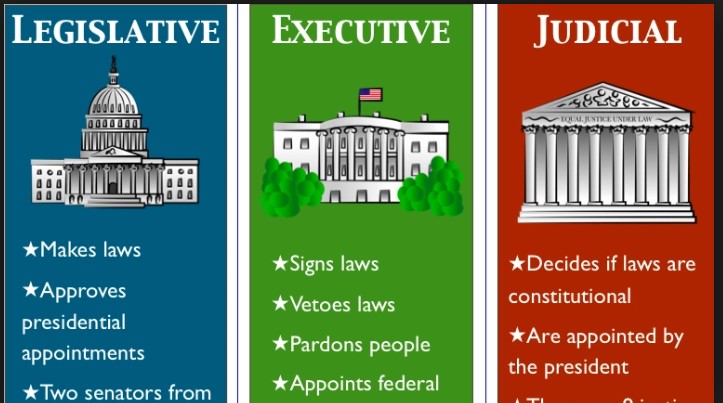
(i)THE LEGISLATURE
This is the body that makes laws. In Nigeria, we have a bicameral legislature in the center namely the Senate and the House of Representatives, while at the state and local government levels, it is unicameral legislature.
Apart from law making, the legislature also performs some other functions such as defense of fundamental human rights, supervision of the executive, ratification of major executive decisions and appointment, as well impeachment of the President when the need arises. The legislative arm of government debates policies of the executives and initiate its own policy proposals, which are called Bills, then, when the bills are approved and signed, they become Laws.
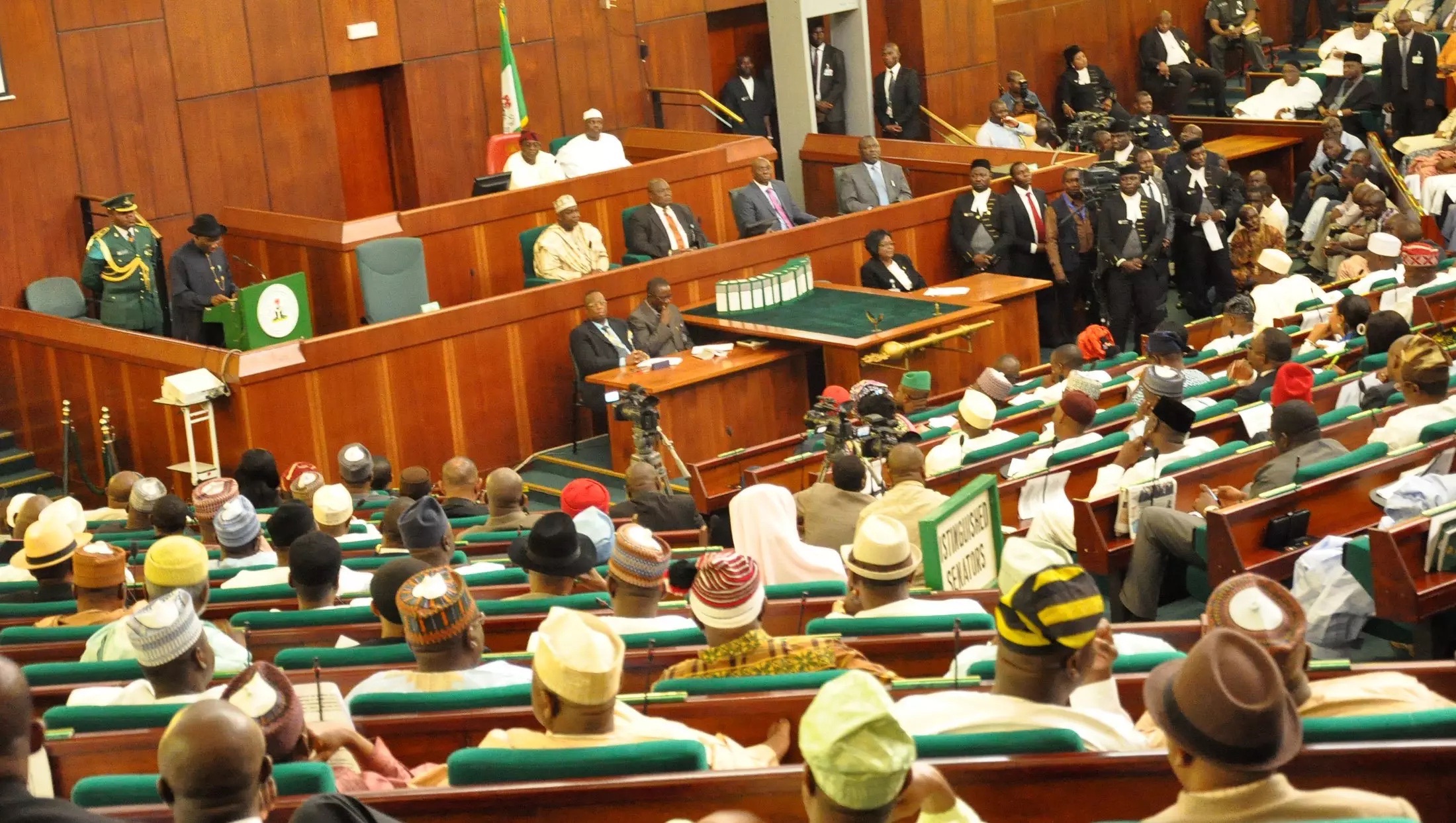
(ii) EXECUTIVE
This is the organ of government responsible for implementing the law. At the Federal level, we have the following as members President, Vice President, Ministers and the civil servants, while in the states, we have the Governors, Deputy Governors, commissioners and the civil service. Other functions of the executive may include formulation of major decisions, creation of employment, maintenance of law and order as well as defending the country form external and internal attacks. These include foreign policy formulation and implementation.
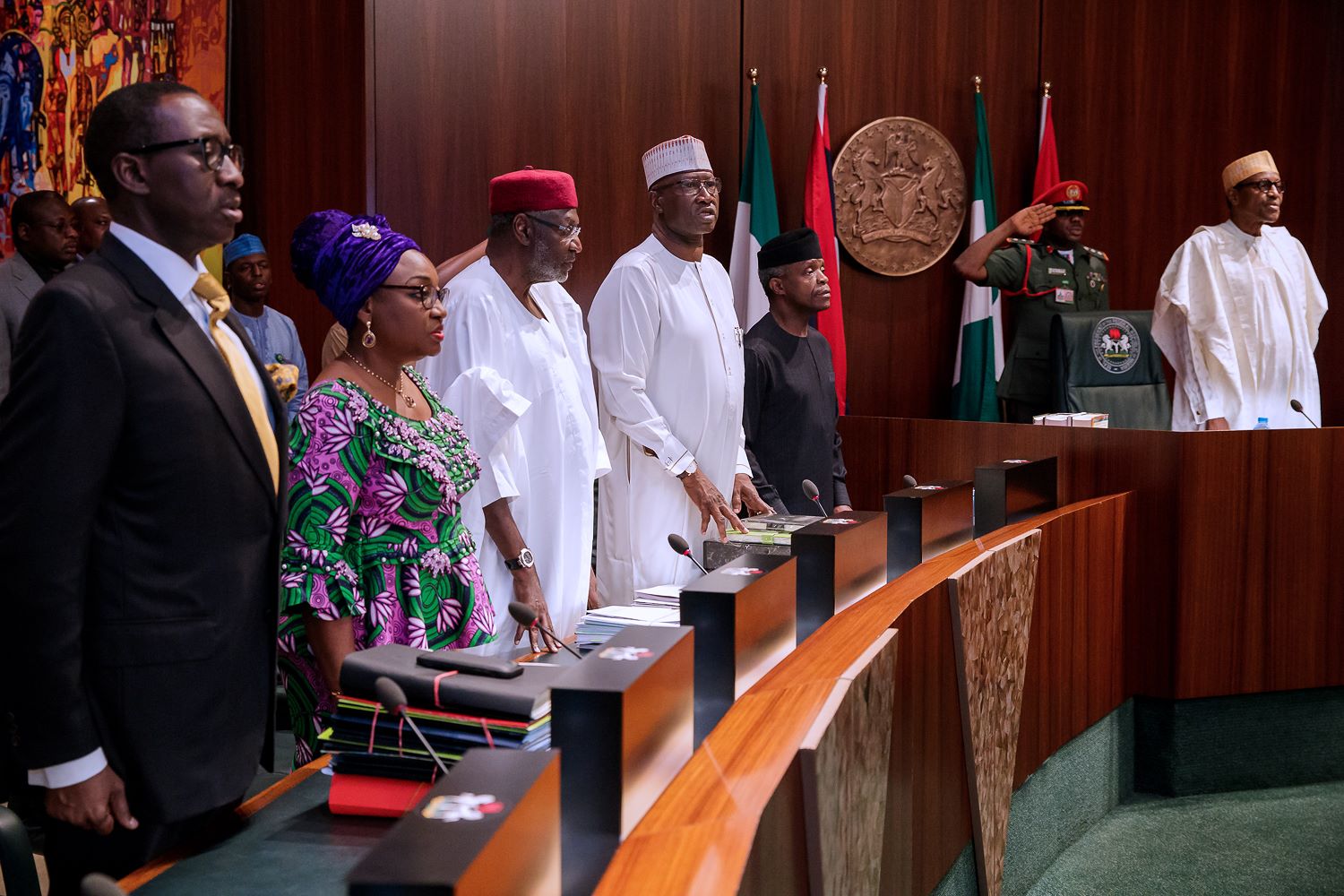
(iii) JUDICIARY
This is the organ of government responsible for law interpretation and settlement of disputes. They also defend the rights of the people and punish lawbreakers. This organ of government is mainly made up of the court of law. The court is seen as the last hope of the common man. Therefore, there is need for the independence of the judiciary.
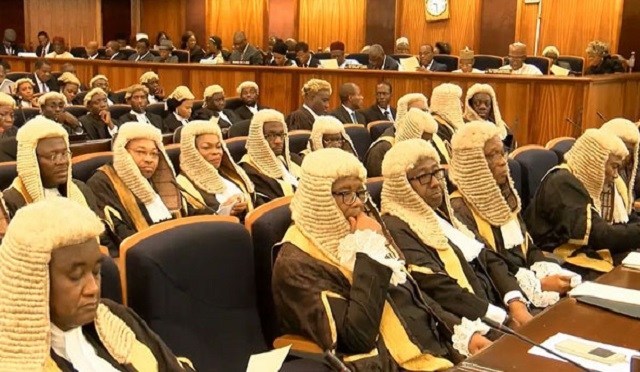
(c) Offices and symbols of authority
Symbols of authority are objects or images used as distinguishing signs by people and institutions in positions of power.
1. The symbol of authority of the legislature is the Mace. No deliberation can take place without the mace
2. The symbol of authority for the executive is the National Flag and Coat of Arms.
3. The symbol of authority for the court or judiciary is the Wig.
4. There are also the Bible and the Quran for oath taking.
Evaluation:
1. What is government?
2. What is anarchy?
3. List and explain the three arms of government.
4. List four symbols of authority and their importance to the attached offices.
Topic: GOVERNMENT
(a) Meaning of government
Government can be defined as an agency or machinery through which the will and policies of the state are formulated, expressed and implemented. Government is also an institution or body of persons that takes care of the interest and welfare of the people.
It is an act of governing or ruling a state. It is seen as an agency, system or organ having a state and maintaining its security, peace and progress. It has its institutional, academic and administrative field of explanation. A state without government therefore will experience anarchy.
https://youtu.be/Q_DeR44gzOw
(b) Arms of government
The business of government of a state is mainly carried out by the three basic organs of government namely: Legislature, Executive and the Judiciary. These arms of government perform their respective constitutional functions which make the government to run without much hitches if they are properly carried out.

(i)THE LEGISLATURE
This is the body that makes laws. In Nigeria, we have a bicameral legislature in the center namely the Senate and the House of Representatives, while at the state and local government levels, it is unicameral legislature.
Apart from law making, the legislature also performs some other functions such as defense of fundamental human rights, supervision of the executive, ratification of major executive decisions and appointment, as well impeachment of the President when the need arises. The legislative arm of government debates policies of the executives and initiate its own policy proposals, which are called Bills, then, when the bills are approved and signed, they become Laws.

(ii) EXECUTIVE
This is the organ of government responsible for implementing the law. At the Federal level, we have the following as members President, Vice President, Ministers and the civil servants, while in the states, we have the Governors, Deputy Governors, commissioners and the civil service. Other functions of the executive may include formulation of major decisions, creation of employment, maintenance of law and order as well as defending the country form external and internal attacks. These include foreign policy formulation and implementation.

(iii) JUDICIARY
This is the organ of government responsible for law interpretation and settlement of disputes. They also defend the rights of the people and punish lawbreakers. This organ of government is mainly made up of the court of law. The court is seen as the last hope of the common man. Therefore, there is need for the independence of the judiciary.

(c) Offices and symbols of authority
Symbols of authority are objects or images used as distinguishing signs by people and institutions in positions of power.
1. The symbol of authority of the legislature is the Mace. No deliberation can take place without the mace
2. The symbol of authority for the executive is the National Flag and Coat of Arms.
3. The symbol of authority for the court or judiciary is the Wig.
4. There are also the Bible and the Quran for oath taking.
Evaluation:
1. What is government?
2. What is anarchy?
3. List and explain the three arms of government.
4. List four symbols of authority and their importance to the attached offices.
WEEK 2
LESSON 2
Sub-topic: Functions and powers of government
1. One of the major functions of government is law making. The members of the executive arm formulate policies and ensure that the policies are carried through various ministries and agencies.
2. Government also has the responsibility to maintain law and order. This is done through the police so as to maintain peace and order in the state.
3. Government also provides jobs for the people depending on the vacant position as government cannot employ everybody looking for Job.
4. It is the duty of the government to defend the state from external and internal attacks through the Armed Forces.
5. Government also protects the rights of the citizens from being infringed upon by the individuals or influential members of the society.
6. Government also relates with other countries of the world.
7. The State exists to promote happiness to greater number of people. Therefore, government provides social amenities like roads, transport, education, electricity, water and so on.
8. Government regulates economic activities by deciding on which economic programmes to adopt
9. Government has the power to punish offenders that disobey law
10. Government can declare a state of emergency in any state that the government can no longer control the situation where the peace of the state is threatened
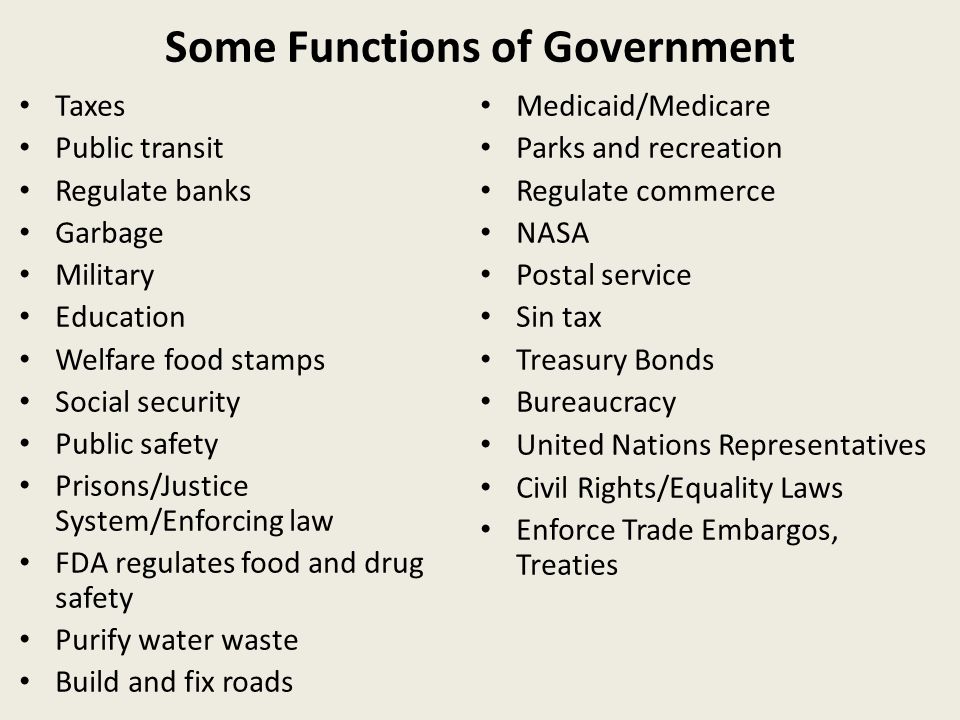
(e) Need for checks and balances in government
According to Lord Acton, ‘power corrupts and absolute power corrupts absolutely’. The powers of the three organs must be checked to experience stability in a state. The reasons for such checks and balances are:
1. To prevent one organ of government from becoming too powerful in a state.
2. To ensure stability in government, the power must be checked
3. To prevent one organ of government from exceeding the limits of its powers
4. To prevent oppression and tyranny in a state, so that people will not be oppressed anyhow.
5. Checks and balances can also be ensured through the adoption of separation of power.
6. Checks and balances will also ensure that every arm of government acts in accordance with the laid down rules and regulations of the state.
7. Checks and balances will also help to defend the rights of the citizens.
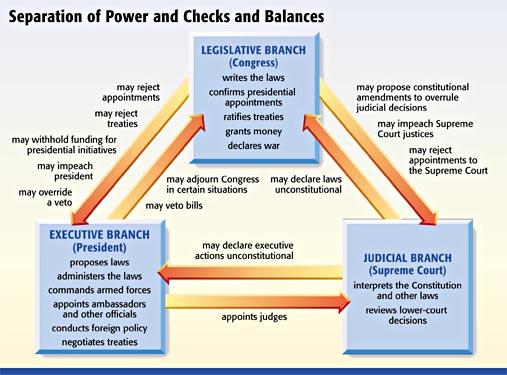
Evaluation:
1. Outline five functions of government.
2. List six reasons for checks and balances among the three arms of government.
Sub-topic: Functions and powers of government
1. One of the major functions of government is law making. The members of the executive arm formulate policies and ensure that the policies are carried through various ministries and agencies.
2. Government also has the responsibility to maintain law and order. This is done through the police so as to maintain peace and order in the state.
3. Government also provides jobs for the people depending on the vacant position as government cannot employ everybody looking for Job.
4. It is the duty of the government to defend the state from external and internal attacks through the Armed Forces.
5. Government also protects the rights of the citizens from being infringed upon by the individuals or influential members of the society.
6. Government also relates with other countries of the world.
7. The State exists to promote happiness to greater number of people. Therefore, government provides social amenities like roads, transport, education, electricity, water and so on.
8. Government regulates economic activities by deciding on which economic programmes to adopt
9. Government has the power to punish offenders that disobey law
10. Government can declare a state of emergency in any state that the government can no longer control the situation where the peace of the state is threatened

(e) Need for checks and balances in government
According to Lord Acton, ‘power corrupts and absolute power corrupts absolutely’. The powers of the three organs must be checked to experience stability in a state. The reasons for such checks and balances are:
1. To prevent one organ of government from becoming too powerful in a state.
2. To ensure stability in government, the power must be checked
3. To prevent one organ of government from exceeding the limits of its powers
4. To prevent oppression and tyranny in a state, so that people will not be oppressed anyhow.
5. Checks and balances can also be ensured through the adoption of separation of power.
6. Checks and balances will also ensure that every arm of government acts in accordance with the laid down rules and regulations of the state.
7. Checks and balances will also help to defend the rights of the citizens.

Evaluation:
1. Outline five functions of government.
2. List six reasons for checks and balances among the three arms of government.
WEEK 3
LESSON 3
: LEADERSHIP AND FOLLOWERSHIP
(a) Meaning of Leadership and Followership:
A leader is a person who guides and directs other people in order to achieve a given task. Whereas; leadership implies the ability to guide or influence people in a proper direction. Leadership is position a leader occupies to lead and guide other people to a desired goal.
On the other hand, a follower is a person who follows the instruction of a leader. Followership is the willingness to accept the established and communicated vision of a leader by the citizens of a state. A call to leadership is a call to serve, while a follower must do the bidding of his leader to the extent that it does not run ‘ultra vires’ (acting beyond the limit of power) the constitution.

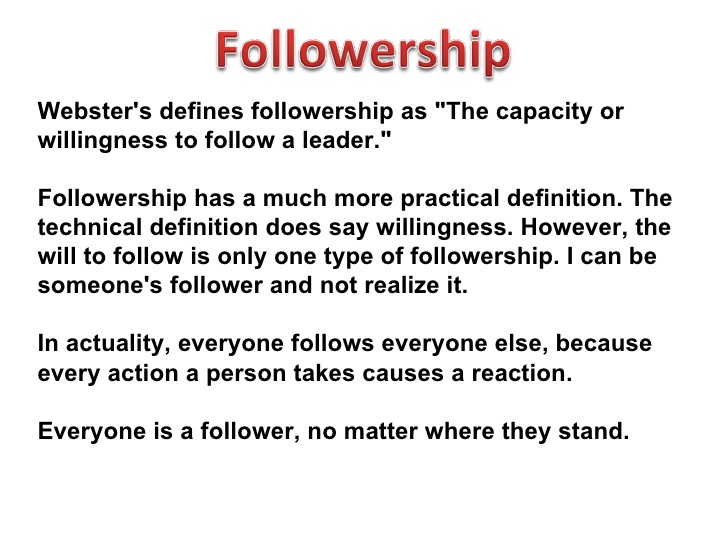
(b) Qualities of a good leader
A leader is said to be good and efficient when he/she has been assessed and these following qualities are found through his/her character.
1. A good leader must be disciplined. He must do what is right always
2. He must live and lead by example so that his followers can emulate his good deeds.
3. He must be wise and knowledgeable. He must know what to do per time when faced with challenges.
4. He must be friendly with the people around him so that he can carry them along in the decision making.
5. He must be punctual at work or at any position he may find himself. This is the hallmark of a good leader.
6. He must be honest. He must be known for truth and stand by truth no matter the situation or whoever is involved.
7. He must not be corrupt. He should be accountable to the people that he is serving and be of exemplary character.
https://www.slideshare.net/mithisood/pr ... ip-9401617
( c) QUALITIES OF GOOD FOLLOWER
1. A Good follower must obey all rules and regulations set by his or her leader.
2. He must be truthful so that he can be trusted by other people in the society.
3. He must be respectful and be ready to take instruction from his leader.
4. He must be a loyal member of the group especially loyalty to his leader.
5. He must be disciplined by doing what is right at all times even without being told.
6. A follower can correct his leader constructively not with the aim of destroying his leader.
7. As a follower, he/she must be present at every meeting that his/her leader expects he/she to be.
https://www.slideshare.net/bajulgogoi/f ... p-28417790
(d) Consequence of bad leadership and followership
When things are not done the right way, it may produce negative result from both the leaders and followers. The following are the negative effects of bad leadership or followership:
1. Civil Unrest – When we have bad people in the position of authority, there may be civil unrest as people may take laws into their hands in order to check misuse of power.
2. Economic hardship – When we have bad leaders in position of authority, they may not pursue programmes that may benefit the people. Fund may be misappropriated causing untold hardship on the people
3. People may also be denied their fundamental human rights as those in authority are concerned with their narrow interests at the expense of the people
4. There may be failure on the side of government to deliver good programmes for the people
5. Waste of resources: There may also be waste of resources by the government as there may be embezzlement of funds.
6. There may also be corruption and indiscipline in the society, which may start from the top to the bottom
7. The overall country be backward in the comity of nations
https://youtu.be/zkxO0UHd3JE
https://youtu.be/6By-2FStxH0
Evaluation:
1. Differentiate between a leader and leadership.
2. What is different between a follower and followership?
3. List and explain six qualities of a good leader and follower.
4. Outline five consequences of bad leadership followership to the society.
: LEADERSHIP AND FOLLOWERSHIP
(a) Meaning of Leadership and Followership:
A leader is a person who guides and directs other people in order to achieve a given task. Whereas; leadership implies the ability to guide or influence people in a proper direction. Leadership is position a leader occupies to lead and guide other people to a desired goal.
On the other hand, a follower is a person who follows the instruction of a leader. Followership is the willingness to accept the established and communicated vision of a leader by the citizens of a state. A call to leadership is a call to serve, while a follower must do the bidding of his leader to the extent that it does not run ‘ultra vires’ (acting beyond the limit of power) the constitution.


(b) Qualities of a good leader
A leader is said to be good and efficient when he/she has been assessed and these following qualities are found through his/her character.
1. A good leader must be disciplined. He must do what is right always
2. He must live and lead by example so that his followers can emulate his good deeds.
3. He must be wise and knowledgeable. He must know what to do per time when faced with challenges.
4. He must be friendly with the people around him so that he can carry them along in the decision making.
5. He must be punctual at work or at any position he may find himself. This is the hallmark of a good leader.
6. He must be honest. He must be known for truth and stand by truth no matter the situation or whoever is involved.
7. He must not be corrupt. He should be accountable to the people that he is serving and be of exemplary character.
https://www.slideshare.net/mithisood/pr ... ip-9401617
( c) QUALITIES OF GOOD FOLLOWER
1. A Good follower must obey all rules and regulations set by his or her leader.
2. He must be truthful so that he can be trusted by other people in the society.
3. He must be respectful and be ready to take instruction from his leader.
4. He must be a loyal member of the group especially loyalty to his leader.
5. He must be disciplined by doing what is right at all times even without being told.
6. A follower can correct his leader constructively not with the aim of destroying his leader.
7. As a follower, he/she must be present at every meeting that his/her leader expects he/she to be.
https://www.slideshare.net/bajulgogoi/f ... p-28417790
(d) Consequence of bad leadership and followership
When things are not done the right way, it may produce negative result from both the leaders and followers. The following are the negative effects of bad leadership or followership:
1. Civil Unrest – When we have bad people in the position of authority, there may be civil unrest as people may take laws into their hands in order to check misuse of power.
2. Economic hardship – When we have bad leaders in position of authority, they may not pursue programmes that may benefit the people. Fund may be misappropriated causing untold hardship on the people
3. People may also be denied their fundamental human rights as those in authority are concerned with their narrow interests at the expense of the people
4. There may be failure on the side of government to deliver good programmes for the people
5. Waste of resources: There may also be waste of resources by the government as there may be embezzlement of funds.
6. There may also be corruption and indiscipline in the society, which may start from the top to the bottom
7. The overall country be backward in the comity of nations
https://youtu.be/zkxO0UHd3JE
https://youtu.be/6By-2FStxH0
Evaluation:
1. Differentiate between a leader and leadership.
2. What is different between a follower and followership?
3. List and explain six qualities of a good leader and follower.
4. Outline five consequences of bad leadership followership to the society.
WEEK 4
LESSON 4
Topic: RULE OF LAW
(a) THE MEANING OF RULE OF LAW
The rule of law means supremacy of the law, equality before the law and the adoption of fundamental human rights in a democratic state. This means the law rules and nothing else. That also means the law is not a respecter of person in any given state. The rule of law was developed by Professor A.V. Dicey who wrote a book in 1885 titled, Introduction to the Study of Law of the Constitution in which he said “the rule of law is necessary to prevent oppression and tyranny”. Rule of Law is based on the notion that decisions should be made by applying known principles or laws, without resorting to the use personal judgment or discretion.
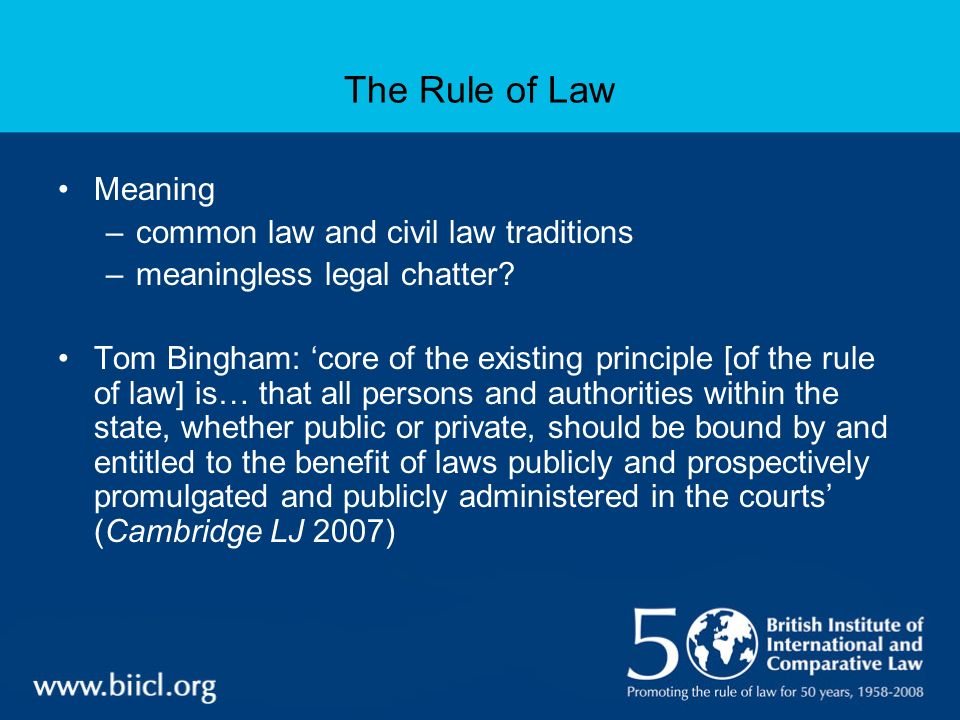
(b) Benefits of the rule of law as against arbitrary rule
1. The application of the rule of law will ensure that government will run in accordance with the dictates of the constitution
2. The rule of law will guarantee the independence of the Judiciary as the custodian and interpreter of the country’s constitution
3. The rule of law will also promote stability in government, as all the organs of government will act according to the stated laws.
4. The rule of law will equally promote the fundamental human rights of the citizens, as the law will prevent any infringement upon such rights.
5. The notion of the rule of law will also promote the doctrine of separation of powers and checks and balances as no organ of government will interfere in the functions of other organs
6. The rule of law will also prevent oppression and tyranny in the society, as autocratic leaders will have no place in government
7. The rule of law will also promote steady progress in the society.
https://youtu.be/9Gtlc7tBRMA
(c) PUNISHMENT FOR LAW BREAKING
1. Withdrawal of rights: When a law is broken, the rights due to an individual may be withdrawn such as the freedom of movement
2. Detention: An accused can be detained in a prison for any breaking of the law.
3. Services: When certain people break any law, it may prevent the government from providing certain amenities to the people.
4. Political instability: Breaking of the law may lead to breakdown of law and order in a state and anarchy may reign in such state.
5. Sanctions: Government may impose any form of sanction on individual or group of people
6. Lack of security: When laws are broken government may not be able to protect the lives and property of the citizens
(d) Equality before the Law
This is based on the idea that all citizens are born equal and therefore, are equal before the law. That means the law is not a respecter of person. The same law applies to both the ruler and the ruled hence; people are subject to the same court in a state. Therefore, there should be no secret trial of any accused person. An ordinary citizen can take any government official including the president to court on any given issue. This principle admits no class (status) in the society. Nevertheless, this principle equalizes everybody yet, special rights are reserved for the infants that cannot be charged to court for any criminal offence. Governors, ambassadors etc, cannot be arrested or tried in court while in office.
https://youtu.be/KdfEa7Ym1D8
Evaluation:
1. What is rule of law?
2. List five benefits of the rule of law as against arbitrary rule.
3. Outline five punishments that await the law breakers
4. Discuss the principle of equality before the law
Topic: RULE OF LAW
(a) THE MEANING OF RULE OF LAW
The rule of law means supremacy of the law, equality before the law and the adoption of fundamental human rights in a democratic state. This means the law rules and nothing else. That also means the law is not a respecter of person in any given state. The rule of law was developed by Professor A.V. Dicey who wrote a book in 1885 titled, Introduction to the Study of Law of the Constitution in which he said “the rule of law is necessary to prevent oppression and tyranny”. Rule of Law is based on the notion that decisions should be made by applying known principles or laws, without resorting to the use personal judgment or discretion.

(b) Benefits of the rule of law as against arbitrary rule
1. The application of the rule of law will ensure that government will run in accordance with the dictates of the constitution
2. The rule of law will guarantee the independence of the Judiciary as the custodian and interpreter of the country’s constitution
3. The rule of law will also promote stability in government, as all the organs of government will act according to the stated laws.
4. The rule of law will equally promote the fundamental human rights of the citizens, as the law will prevent any infringement upon such rights.
5. The notion of the rule of law will also promote the doctrine of separation of powers and checks and balances as no organ of government will interfere in the functions of other organs
6. The rule of law will also prevent oppression and tyranny in the society, as autocratic leaders will have no place in government
7. The rule of law will also promote steady progress in the society.
https://youtu.be/9Gtlc7tBRMA
(c) PUNISHMENT FOR LAW BREAKING
1. Withdrawal of rights: When a law is broken, the rights due to an individual may be withdrawn such as the freedom of movement
2. Detention: An accused can be detained in a prison for any breaking of the law.
3. Services: When certain people break any law, it may prevent the government from providing certain amenities to the people.
4. Political instability: Breaking of the law may lead to breakdown of law and order in a state and anarchy may reign in such state.
5. Sanctions: Government may impose any form of sanction on individual or group of people
6. Lack of security: When laws are broken government may not be able to protect the lives and property of the citizens
(d) Equality before the Law
This is based on the idea that all citizens are born equal and therefore, are equal before the law. That means the law is not a respecter of person. The same law applies to both the ruler and the ruled hence; people are subject to the same court in a state. Therefore, there should be no secret trial of any accused person. An ordinary citizen can take any government official including the president to court on any given issue. This principle admits no class (status) in the society. Nevertheless, this principle equalizes everybody yet, special rights are reserved for the infants that cannot be charged to court for any criminal offence. Governors, ambassadors etc, cannot be arrested or tried in court while in office.
https://youtu.be/KdfEa7Ym1D8
Evaluation:
1. What is rule of law?
2. List five benefits of the rule of law as against arbitrary rule.
3. Outline five punishments that await the law breakers
4. Discuss the principle of equality before the law
WEEK 5
LESSON 5
Topic: THE STATE AND THE RULE OF LAW
Sub-topic: State Institutions responsible for the enforcement of the rule of law.
(i) THE LEGISLATURE
The laws made by the legislative are meant to be carried out by the executive. The legislature performs over sight function, which enables it to monitor or supervise the activities of the executive at any given time. The legislature can also summon any government official to appear before it to explain why certain actions are taken. If the constitutional provisions are not followed by the executive, the president of a country can be impeached by members of the National Assembly.

(ii). THE EXECUTIVE
The executive implements the decisions made by the legislature and the Judiciary. Therefore, the executive can engage the law enforcement agencies in making sure that the rule of law is strictly followed by the relevant agencies of government. The executive can also put in place a commission of enquiry to look into violation of the rule of law. Any guilty person can be charged to court.
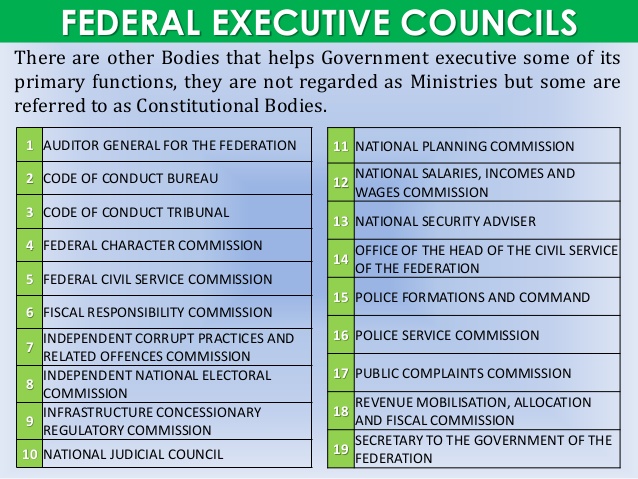
(iii). JUDICIARY
The Judiciary is seen as the last hope of the common man. It is also the final arbiter in cases of constitutional broadness or conflicts among the organs of government. The Judiciary therefore, ensures that laws made are obeyed by relevant agencies of government. The Judiciary also helps to protect the constitution against any infringement by other organs of government. Equally, the Judiciary can declare any negative actions of government as null and void when it runs counter to the provisions of the Federal Republic of Nigeria, This is the reason why people clamour for the independence of the Judiciary. The Judiciary interprets the law made by the legislature.

(iv) The PRESS
The press is seen as the fourth estate of the realm. They watch the actions of the three organs of government. They are to point out any form of infringement against the rule of law.
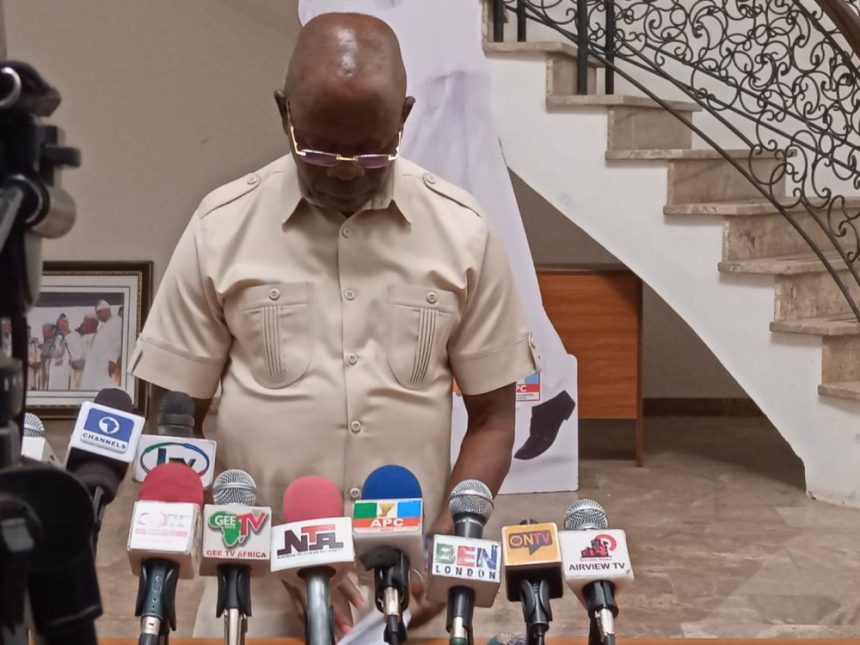
(v). LAW ENFORCEMENT AGENCIES
Government of a country may set up some law enforcement agencies to ensure that the laws made are obeyed by the relevant authorities. This is the basic reason why the government of Nigeria set up some agencies to the observance of the rule of law. Such agencies may include the Nigerian Police, National Drug and Law Enforcement Agencies, (NDLEA); Economic and Financial Crimes Commission (EFCC) and Independent Corrupt Practices Commission (ICPC).
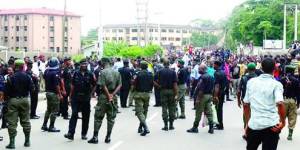
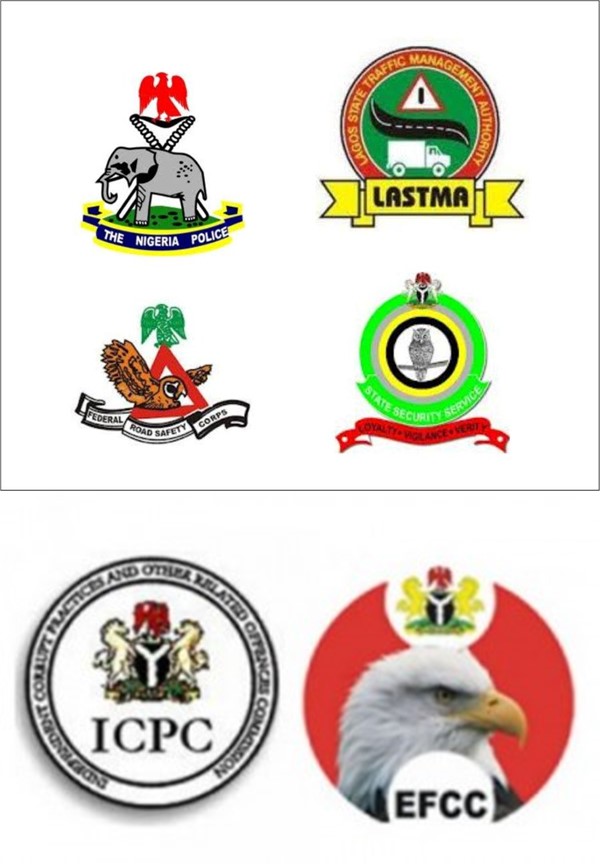
The role of the legislature in making laws for the state
1. It is the duty of the legislature to make laws for the state as provided for in the constitution
2. Equally, the legislature is empowered to amend or change the existing constitution when the need arises.
3. The legislature grants public and local government power to make bye laws for effective administration in a state.
4. The legislature also approves major decisions of government a well as appointment
5. They are also empowered to ratify state of emergency in any state as well as ratification of treaties entered into with another country.
6. They also ensure that relevant authorities in a state enforce relevant laws. Sanctions can be imposed on anyone that defaults.
7. Each legislator equally gives feed back to his or her constituency on the laws made.
Evaluation:
1. State four institutions responsible for the formulation and enforcement of the rule of law.
2. List five roles of the legislature in making laws of the State.
Topic: THE STATE AND THE RULE OF LAW
Sub-topic: State Institutions responsible for the enforcement of the rule of law.
(i) THE LEGISLATURE
The laws made by the legislative are meant to be carried out by the executive. The legislature performs over sight function, which enables it to monitor or supervise the activities of the executive at any given time. The legislature can also summon any government official to appear before it to explain why certain actions are taken. If the constitutional provisions are not followed by the executive, the president of a country can be impeached by members of the National Assembly.

(ii). THE EXECUTIVE
The executive implements the decisions made by the legislature and the Judiciary. Therefore, the executive can engage the law enforcement agencies in making sure that the rule of law is strictly followed by the relevant agencies of government. The executive can also put in place a commission of enquiry to look into violation of the rule of law. Any guilty person can be charged to court.

(iii). JUDICIARY
The Judiciary is seen as the last hope of the common man. It is also the final arbiter in cases of constitutional broadness or conflicts among the organs of government. The Judiciary therefore, ensures that laws made are obeyed by relevant agencies of government. The Judiciary also helps to protect the constitution against any infringement by other organs of government. Equally, the Judiciary can declare any negative actions of government as null and void when it runs counter to the provisions of the Federal Republic of Nigeria, This is the reason why people clamour for the independence of the Judiciary. The Judiciary interprets the law made by the legislature.

(iv) The PRESS
The press is seen as the fourth estate of the realm. They watch the actions of the three organs of government. They are to point out any form of infringement against the rule of law.

(v). LAW ENFORCEMENT AGENCIES
Government of a country may set up some law enforcement agencies to ensure that the laws made are obeyed by the relevant authorities. This is the basic reason why the government of Nigeria set up some agencies to the observance of the rule of law. Such agencies may include the Nigerian Police, National Drug and Law Enforcement Agencies, (NDLEA); Economic and Financial Crimes Commission (EFCC) and Independent Corrupt Practices Commission (ICPC).


The role of the legislature in making laws for the state
1. It is the duty of the legislature to make laws for the state as provided for in the constitution
2. Equally, the legislature is empowered to amend or change the existing constitution when the need arises.
3. The legislature grants public and local government power to make bye laws for effective administration in a state.
4. The legislature also approves major decisions of government a well as appointment
5. They are also empowered to ratify state of emergency in any state as well as ratification of treaties entered into with another country.
6. They also ensure that relevant authorities in a state enforce relevant laws. Sanctions can be imposed on anyone that defaults.
7. Each legislator equally gives feed back to his or her constituency on the laws made.
Evaluation:
1. State four institutions responsible for the formulation and enforcement of the rule of law.
2. List five roles of the legislature in making laws of the State.
WEEK 6
LESSON 6
Sub-topic The role of institutions or agencies of the state in enforcing the rule of law
1. THE EXECUTIVE: They are to see to the implementation of the rule of law in a state. To help them in achieving this, law enforcement agencies can be used to enforce the rule of law.
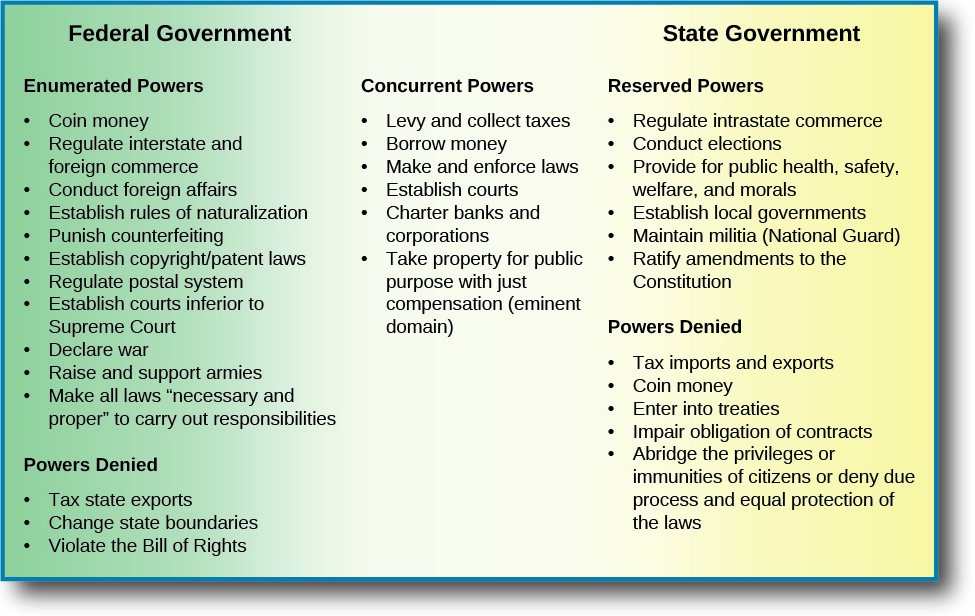
2. THE JUDICIARY: The role of the Judiciary in the application of the rule of law can never be over emphasized. This is because the Judiciary settles disputes concerning the rule of laws ad apportions punishments to the relevant activities. They can declare wrong actions of other organs null and void and of no effect.
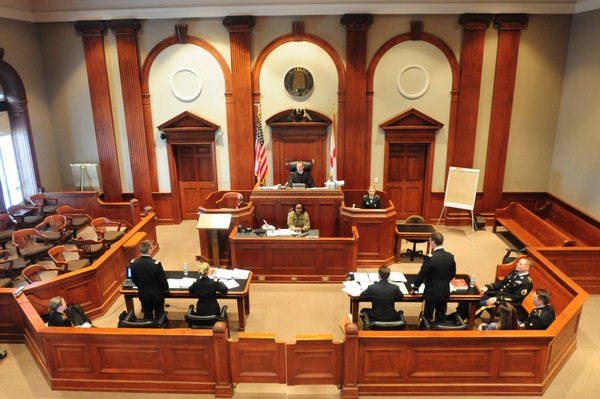
3. THE POLICE: The police are the law enforcement unit of any government. The executive relies on the police to track down offenders of law. Such offenders are taken to court. When the court gives judgement, the police is relied upon, to carry out decisions of the court of law.
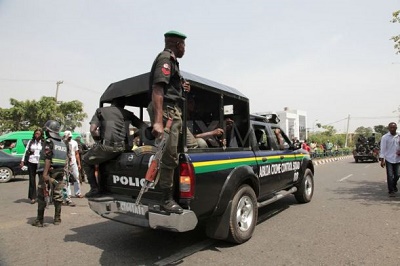
4. THE PRISONS: Any judgment given in a court of law that attracts punishment which may end in prison terms. This is carried out by the Nigeria Prison Service. The Prison service has the duty to keep a criminal who has been sentenced for a jail term as prescribed by the jury.
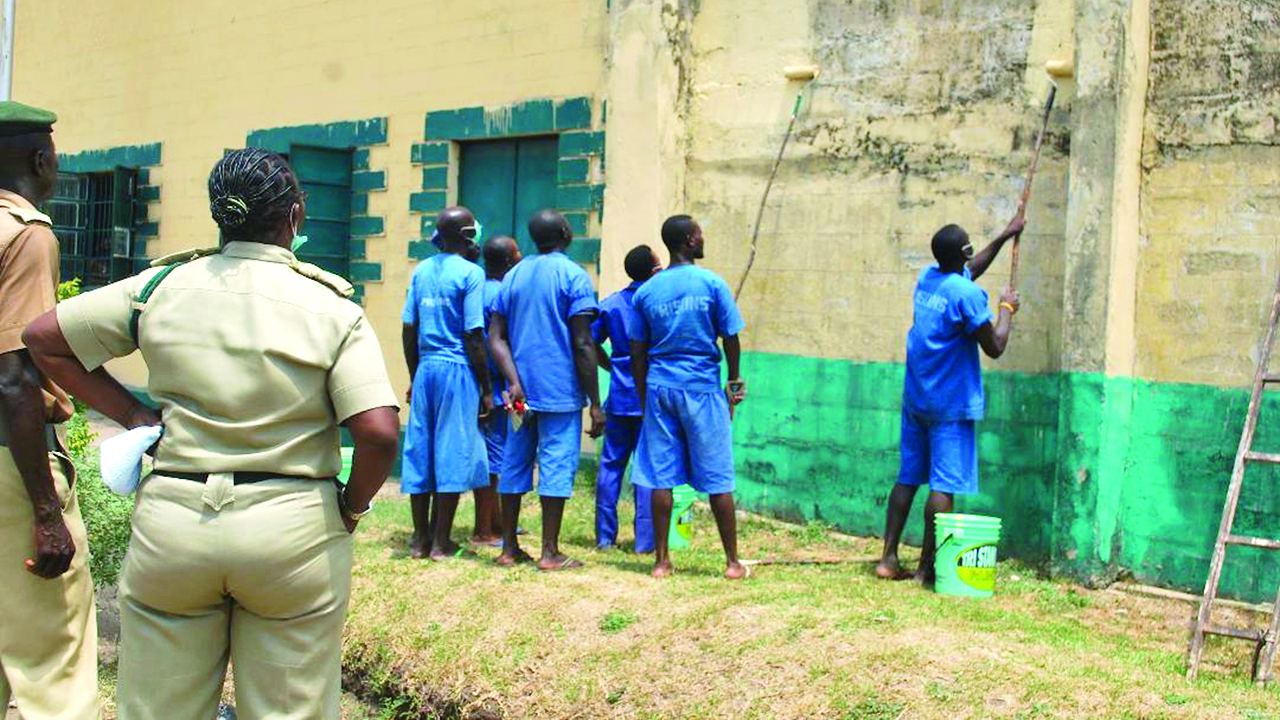
Evaluation:
1. Discuss three roles of the State institutions/agencies in enforcing the rule of law.
2. How do you regard police men? Discuss their roles to the citizens in the state
Sub-topic The role of institutions or agencies of the state in enforcing the rule of law
1. THE EXECUTIVE: They are to see to the implementation of the rule of law in a state. To help them in achieving this, law enforcement agencies can be used to enforce the rule of law.

2. THE JUDICIARY: The role of the Judiciary in the application of the rule of law can never be over emphasized. This is because the Judiciary settles disputes concerning the rule of laws ad apportions punishments to the relevant activities. They can declare wrong actions of other organs null and void and of no effect.

3. THE POLICE: The police are the law enforcement unit of any government. The executive relies on the police to track down offenders of law. Such offenders are taken to court. When the court gives judgement, the police is relied upon, to carry out decisions of the court of law.

4. THE PRISONS: Any judgment given in a court of law that attracts punishment which may end in prison terms. This is carried out by the Nigeria Prison Service. The Prison service has the duty to keep a criminal who has been sentenced for a jail term as prescribed by the jury.

Evaluation:
1. Discuss three roles of the State institutions/agencies in enforcing the rule of law.
2. How do you regard police men? Discuss their roles to the citizens in the state
WEEK 7
LESSON 7
Topic: PROTECTION OF HUMAN RIGHTS AND THE RULE OF LAW (Role of Individuals and groups):
Human Rights are basic dividends and freedom one automatically claims at birth as a human being. These rights differentiate man from lower animals. They enable him to live a life of dignity. All these rights are enshrined in the constitution of Nigeria and are protected by the State.
1. An accused person can be represented in a court of law by an individual or group to fight for such rights.
2. Cases of human rights violation could be taken care of through protest matches against the government by the masses; media coverage of human rights violation. An accused person may also engage on hunger strike
3. There are some human rights protection agencies existing in a state to defend the rights of the citizen such as the Civil Liberty Organization, committee for the defence of human rights, the civil rights projects, trade unions, students union, Ethnic Associations and Legal Aid Council.
4. The legislature can equally make an enabling law to protect the fundamental human rights
5. International organizations like the United Nations and African Union as well as Common Wealth of Nations can help to protect the rights of the citizens by warning against oppressive nations.
6. Pressure groups and political parties can influence public or government decision to enhance the rule of law.
The rule of law means supremacy of the law, equality before the law and the adoption of fundamental human rights in a democratic state. This means the law rules and nothing else. That also means the law is not a respecter of person in any given state.
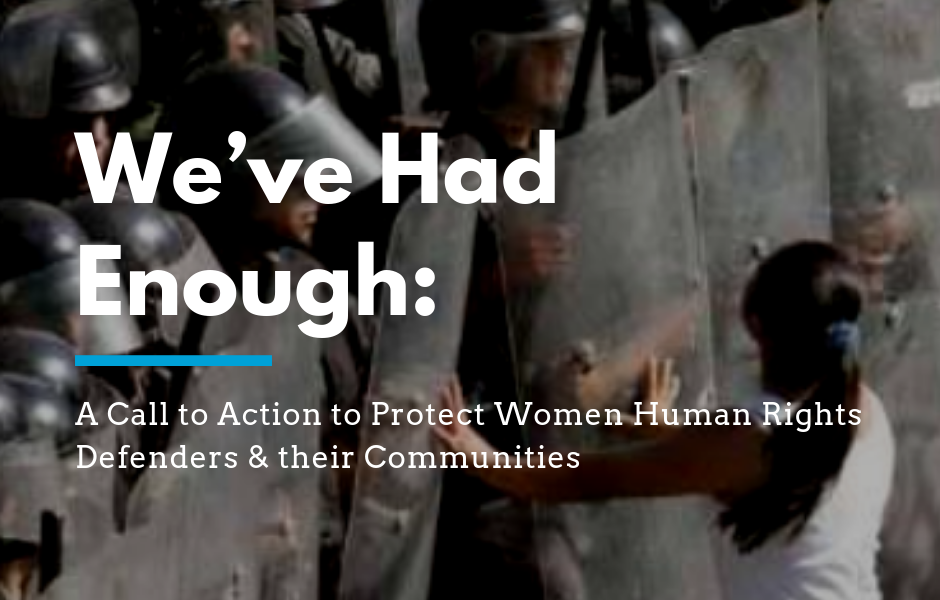
Evaluation:
1. What is human right?
2. Differentiate between human right and rule of law.
3. Itemize four ways a citizen’s right could be protected.
Topic: PROTECTION OF HUMAN RIGHTS AND THE RULE OF LAW (Role of Individuals and groups):
Human Rights are basic dividends and freedom one automatically claims at birth as a human being. These rights differentiate man from lower animals. They enable him to live a life of dignity. All these rights are enshrined in the constitution of Nigeria and are protected by the State.
1. An accused person can be represented in a court of law by an individual or group to fight for such rights.
2. Cases of human rights violation could be taken care of through protest matches against the government by the masses; media coverage of human rights violation. An accused person may also engage on hunger strike
3. There are some human rights protection agencies existing in a state to defend the rights of the citizen such as the Civil Liberty Organization, committee for the defence of human rights, the civil rights projects, trade unions, students union, Ethnic Associations and Legal Aid Council.
4. The legislature can equally make an enabling law to protect the fundamental human rights
5. International organizations like the United Nations and African Union as well as Common Wealth of Nations can help to protect the rights of the citizens by warning against oppressive nations.
6. Pressure groups and political parties can influence public or government decision to enhance the rule of law.
The rule of law means supremacy of the law, equality before the law and the adoption of fundamental human rights in a democratic state. This means the law rules and nothing else. That also means the law is not a respecter of person in any given state.

Evaluation:
1. What is human right?
2. Differentiate between human right and rule of law.
3. Itemize four ways a citizen’s right could be protected.
WEEK 8
LESSON 8
Topic: Protection of Human Rights (cont’d)
Sub-topic: Groups that Assist in Protecting Human Rights of Citizens
Human beings are God’s crown of creation; consequently, he has been naturally endowed with protection since creation of the universe. People do not relax whenever they are experiencing humiliation and intimidation hence; revolution (overthrow of government) may their final solution. Some groups that assist when citizens’ rights are violated include: Students’ unions, trade unions, ethnic associations, legal aid councils, etc.
(i) Civil Society:
These groups of civil society comprise the voluntary and civil organizations/institutions. These groups include: Non-governmental organization (NGOs), cultural groups, religious organizations, Nigeria Labour Congress (NLC), Committee for the Defence of Human Rights (CDHR), Students’ unions, etc.
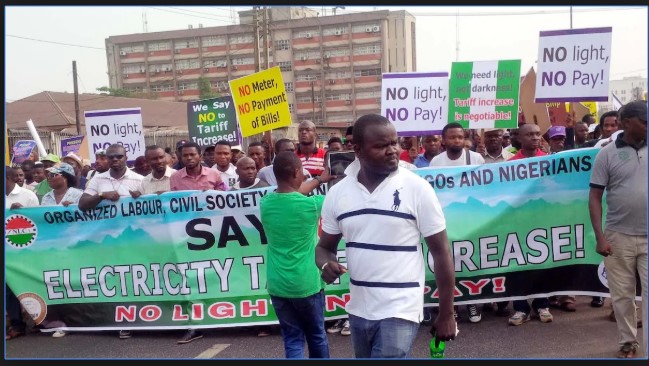
(ii) Trade Union:
This is the body that combines all association of workers that seek to improve the economic and social well-being of its members through group action. In Nigeria, the central body is called Nigeria Labour Congress (NLC). In February, 1978 the NLC was formed and Inaugurated about 42 industrial unions became affiliates of the NLC with a legal backing. Examples of these groups are: National Union of Road Transport Workers (NURTW), National Union of Transport Owners (NATO), National Union of Teachers (NUT), National Union of Journalists (NUT), etc.
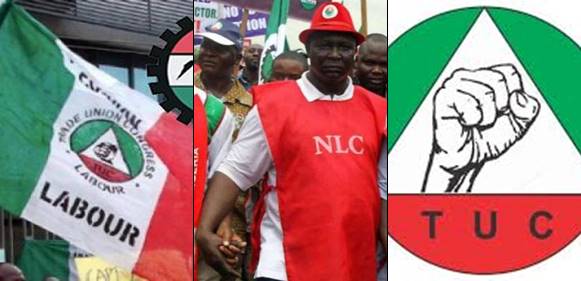
(iii) Students Organizations:
This organization comprises the body of students who stand with the view to defend the students’ interest and can revolt against unconstitutional policies of government. Examples of this body are: National Association of Nigeria Students (NANS). However, this body is for students in tertiary institution of learning.
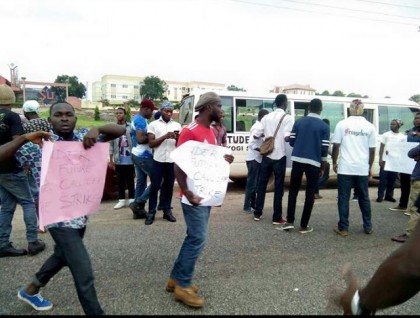
(iv) Ethnic Unions/Associations:
These are associations formed by members of the various ethnic groups. The primary aim of these unions is to protect the individual, ethnic and economic rights of their group.
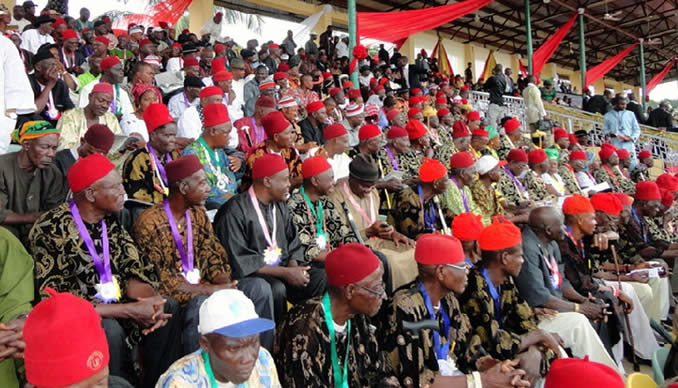
(v) Legal Aid Councils:
These are nongovernmental organizations formed by some public spirited lawyers that provide free legal services to those who cannot afford it. They visit prisons and attend to all cases of people in detention. This is to ensure that those who are illegally detained without trial achieve justice. They also rehabilitate freed prisoners.

Evaluation
1. Comment on four groups that assist in protecting human rights of citizens.
2. Why should the rights of human beings be protected?
Topic: Protection of Human Rights (cont’d)
Sub-topic: Groups that Assist in Protecting Human Rights of Citizens
Human beings are God’s crown of creation; consequently, he has been naturally endowed with protection since creation of the universe. People do not relax whenever they are experiencing humiliation and intimidation hence; revolution (overthrow of government) may their final solution. Some groups that assist when citizens’ rights are violated include: Students’ unions, trade unions, ethnic associations, legal aid councils, etc.
(i) Civil Society:
These groups of civil society comprise the voluntary and civil organizations/institutions. These groups include: Non-governmental organization (NGOs), cultural groups, religious organizations, Nigeria Labour Congress (NLC), Committee for the Defence of Human Rights (CDHR), Students’ unions, etc.

(ii) Trade Union:
This is the body that combines all association of workers that seek to improve the economic and social well-being of its members through group action. In Nigeria, the central body is called Nigeria Labour Congress (NLC). In February, 1978 the NLC was formed and Inaugurated about 42 industrial unions became affiliates of the NLC with a legal backing. Examples of these groups are: National Union of Road Transport Workers (NURTW), National Union of Transport Owners (NATO), National Union of Teachers (NUT), National Union of Journalists (NUT), etc.

(iii) Students Organizations:
This organization comprises the body of students who stand with the view to defend the students’ interest and can revolt against unconstitutional policies of government. Examples of this body are: National Association of Nigeria Students (NANS). However, this body is for students in tertiary institution of learning.

(iv) Ethnic Unions/Associations:
These are associations formed by members of the various ethnic groups. The primary aim of these unions is to protect the individual, ethnic and economic rights of their group.

(v) Legal Aid Councils:
These are nongovernmental organizations formed by some public spirited lawyers that provide free legal services to those who cannot afford it. They visit prisons and attend to all cases of people in detention. This is to ensure that those who are illegally detained without trial achieve justice. They also rehabilitate freed prisoners.

Evaluation
1. Comment on four groups that assist in protecting human rights of citizens.
2. Why should the rights of human beings be protected?
WEEK 9
Study Questions
1. One of these is one of the functions of government. (a)Government relates with other countries of the world (b) Government finds ways to discuss issues with the people.(c) Government determines how people feed in their various families (d) Government is also responsible of how citizens take care of themselves.
2. In what year did the author write a book title “ the law of the constitution’’ (a) 1870(b)1881 (c)1884 (d)1885
3. The agency that is responsible for the enforcement of abuse of drugs is (a)EFCC (b)NTCC (c)ICPO (d)NDLEA
4. ICPC means ………..(a) Independent Citizen people organization (b) Independent Corrupt Practice Commission (c)Independent Certificate Program me Commission (d) Independent Corrupt Permission offender
5. ………… are the bedrock of democracy (a) Children (b)Army (c)people (d) The police
6. Which organ is responsible for the conduct of election in Nigeria? (a)Teachers (b) N.U.T (c) Local Government (d)INEC
7. Where did democracy originate from? (a) Ghana (b) Nigeria (c)Greece (d) Ethiopia.
8. The modern democracy was built upon by the ….. (a) The Russians (b) The Americans (c) The British (d) The Germans
9. Who was the American President that that define democracy as the Government of the people by the people and for the people? (a) George Washington (b) Bill Clinton (c) John Kennedy (d) Abraham Lincoln
10. In which year did he define it? (a) 1859 (b)1860 (c) 1863(d)1865
11. Which among the following controls the activities of trade unions in Nigeria? (a) NUT (b) NLC (c) NURTW (d) NBA
12. Government relies on the ……… to track down offenders of law In Nigeria. (a)The doctors (b) The lawyers (c) The police (d)The traders.
13. Which among the following best describe ‘The rule of law’ Supremacy of the law (b) The majority (c) The law court (d) The leader.
14. ……. Is not a law enforcement agency in Nigeria (a) National Bureau of Investigation (b)Nigerian Police Force (NPF) (c) National Drug and Law Enforcement Agencies (NDLEA) (d) Economic and Financial Crimes Commission (EFCC) and Independent Corrupt Practices Commission (ICPC).
15. Government can be defined as------ (a) A way of governing a particular state. (b) An agency or machinery through which the will and polices of the state is formulated, expressed and implemented. (c) Is a way of life (d) tradition by which Oba or Emir rule a particular town.
16. The three arms of government include (a) The Advocacy, tyranny and judiciary(b)The legislature, the judiciary and the executive (c) Democracy, executive and the rule of law (d) The legislature, communism and advocacy
17. A good leader must be disciplined. He must do what is right always (a) True (b)False (c)Impossible (d)Incomplete sentence
18. Who developed the rule of law? (a) Professor Henry Shaw (b) Professor James Peters (c) Professor A.V. Dicey (d) Professor Smith Gold
19. One of these is the last hope of the common man (a) The Executive,(b) The Judiciary,(c) The Legislature (d) The Press
20. Which of these is the symbol of authority of the legislature? (a) National Flag (b) The Mace (c) Wig (d) Oath taking
21. To be eligible to vote, you have to be---------- (a) 17 years of age (b) 18 years of age (c) 19 tears of age (d) None of the above
22. What is a majority rule? (a) Majority rule is a form of representative democracy where people actually participate in the election of their leaders (b) Majority rule deals with how people interact freely with themselves (c) Majority rule is a form of government where people deliberately ignore the rule of law (d) Majority rule is a tradition that makes people decide on whom to govern them.
23. The following are the qualities of a Truthfulness good leader except: (a) Honesty (b) Selfishness (c) (d) Kindness
24. The government agency that is responsible for keeping the criminals in a jail custody is-------- (a) The Police (b) The Prison service (c) The Custom service (d) The Prisoners
25. Which of these is a symbol of authority of the judiciary? (a) The Mace (b) the Wig (c) National Flag (d) Coat of Arms.
Theory Questions
1. Define the term government
2. What is anarchy?
3. List and explain the three arms of government
4. Mention four symbols of authority and their importance to the attached offices.
5. Outline five functions of government.
6. List four reasons for checks and balances among the three arms of government.
7. Differentiate between a leader and leadership.
8. What is different between a follower and followership?
9. List and explain six qualities of a good leader and follower.
10. Outline five consequences of bad leadership/followership to the society.
11. What is rule of law?
12. List five benefits of the rule of law as against arbitrary rule.
13. Outline five punishments that await the law breakers
14. Discuss the principle of equality before the law
15. State four institutions responsible for the formulation and enforcement of the rule of law.
16. List three roles of the legislature in making laws of the State.
17. Discuss three roles of the State institutions/agencies in enforcing the rule of law.
18. Who is the police? Discuss their roles to the citizens in the state
19. What is human right?
20. Differentiate between human right and rule of law.
21. Itemize four ways a citizen’s right could be protected.
22. Comment on four groups that assist in protecting human rights of citizens.
23. Why should the rights of human beings be protected?
1. One of these is one of the functions of government. (a)Government relates with other countries of the world (b) Government finds ways to discuss issues with the people.(c) Government determines how people feed in their various families (d) Government is also responsible of how citizens take care of themselves.
2. In what year did the author write a book title “ the law of the constitution’’ (a) 1870(b)1881 (c)1884 (d)1885
3. The agency that is responsible for the enforcement of abuse of drugs is (a)EFCC (b)NTCC (c)ICPO (d)NDLEA
4. ICPC means ………..(a) Independent Citizen people organization (b) Independent Corrupt Practice Commission (c)Independent Certificate Program me Commission (d) Independent Corrupt Permission offender
5. ………… are the bedrock of democracy (a) Children (b)Army (c)people (d) The police
6. Which organ is responsible for the conduct of election in Nigeria? (a)Teachers (b) N.U.T (c) Local Government (d)INEC
7. Where did democracy originate from? (a) Ghana (b) Nigeria (c)Greece (d) Ethiopia.
8. The modern democracy was built upon by the ….. (a) The Russians (b) The Americans (c) The British (d) The Germans
9. Who was the American President that that define democracy as the Government of the people by the people and for the people? (a) George Washington (b) Bill Clinton (c) John Kennedy (d) Abraham Lincoln
10. In which year did he define it? (a) 1859 (b)1860 (c) 1863(d)1865
11. Which among the following controls the activities of trade unions in Nigeria? (a) NUT (b) NLC (c) NURTW (d) NBA
12. Government relies on the ……… to track down offenders of law In Nigeria. (a)The doctors (b) The lawyers (c) The police (d)The traders.
13. Which among the following best describe ‘The rule of law’ Supremacy of the law (b) The majority (c) The law court (d) The leader.
14. ……. Is not a law enforcement agency in Nigeria (a) National Bureau of Investigation (b)Nigerian Police Force (NPF) (c) National Drug and Law Enforcement Agencies (NDLEA) (d) Economic and Financial Crimes Commission (EFCC) and Independent Corrupt Practices Commission (ICPC).
15. Government can be defined as------ (a) A way of governing a particular state. (b) An agency or machinery through which the will and polices of the state is formulated, expressed and implemented. (c) Is a way of life (d) tradition by which Oba or Emir rule a particular town.
16. The three arms of government include (a) The Advocacy, tyranny and judiciary(b)The legislature, the judiciary and the executive (c) Democracy, executive and the rule of law (d) The legislature, communism and advocacy
17. A good leader must be disciplined. He must do what is right always (a) True (b)False (c)Impossible (d)Incomplete sentence
18. Who developed the rule of law? (a) Professor Henry Shaw (b) Professor James Peters (c) Professor A.V. Dicey (d) Professor Smith Gold
19. One of these is the last hope of the common man (a) The Executive,(b) The Judiciary,(c) The Legislature (d) The Press
20. Which of these is the symbol of authority of the legislature? (a) National Flag (b) The Mace (c) Wig (d) Oath taking
21. To be eligible to vote, you have to be---------- (a) 17 years of age (b) 18 years of age (c) 19 tears of age (d) None of the above
22. What is a majority rule? (a) Majority rule is a form of representative democracy where people actually participate in the election of their leaders (b) Majority rule deals with how people interact freely with themselves (c) Majority rule is a form of government where people deliberately ignore the rule of law (d) Majority rule is a tradition that makes people decide on whom to govern them.
23. The following are the qualities of a Truthfulness good leader except: (a) Honesty (b) Selfishness (c) (d) Kindness
24. The government agency that is responsible for keeping the criminals in a jail custody is-------- (a) The Police (b) The Prison service (c) The Custom service (d) The Prisoners
25. Which of these is a symbol of authority of the judiciary? (a) The Mace (b) the Wig (c) National Flag (d) Coat of Arms.
Theory Questions
1. Define the term government
2. What is anarchy?
3. List and explain the three arms of government
4. Mention four symbols of authority and their importance to the attached offices.
5. Outline five functions of government.
6. List four reasons for checks and balances among the three arms of government.
7. Differentiate between a leader and leadership.
8. What is different between a follower and followership?
9. List and explain six qualities of a good leader and follower.
10. Outline five consequences of bad leadership/followership to the society.
11. What is rule of law?
12. List five benefits of the rule of law as against arbitrary rule.
13. Outline five punishments that await the law breakers
14. Discuss the principle of equality before the law
15. State four institutions responsible for the formulation and enforcement of the rule of law.
16. List three roles of the legislature in making laws of the State.
17. Discuss three roles of the State institutions/agencies in enforcing the rule of law.
18. Who is the police? Discuss their roles to the citizens in the state
19. What is human right?
20. Differentiate between human right and rule of law.
21. Itemize four ways a citizen’s right could be protected.
22. Comment on four groups that assist in protecting human rights of citizens.
23. Why should the rights of human beings be protected?